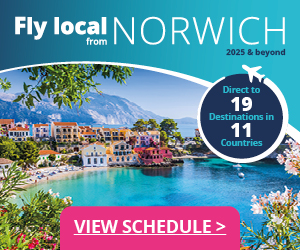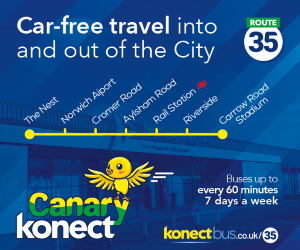COVID BOUNCEBACK ACCELERATES AT REGIONAL & CITY AIRPORTS
Regional & City Airports (RCA) has unveiled strong summer performance numbers for its airport portfolio, with operations at Norwich, Bournemouth and Exeter taking significant steps this summer to bounce back from the impact of the COVID pandemic.
A combination of short security queues, expert local teams and a dearth of the baggage handling issues that beset the UK’s larger airports this summer has underpinned a strong post-pandemic recovery – with passengers, routes and new airlines returning to RCA’s key regional sites in encouraging numbers.
Enjoying an encouraging recovery curve in line with the experience of many other UK airports, Norwich Airport saw passenger numbers recover to hit 163,000 this summer compared to 280,000 pre-COVID, contributing to a 2022 forecast that annual passenger numbers will reach 350,000 this year compared to the pre-pandemic total of 500,000.
Numbers were again boosted by the strong performance of leisure flights, with charter flights to 10 sunshine destinations performing strongly, while full resumption of KLM’s scheduled three daily flights to Amsterdam, an increase in passenger uptake on Loganair’s regular Exeter service, and the return to full strength of the oil and gas industry route to Aberdeen underpinning a marked recovery.
Richard Pace, Managing Director of Norwich Airport, said: “We are making solid progress at Norwich Airport and have seen steadily increasing passenger numbers during the period, with this upward trend accelerating during August and again in September, providing us with real confidence for 2023.
“As the country and the industry emerged from the pandemic, we were faced with the significant challenge of rebuilding our network and I want to thank our fantastic team for the highly professional way they have come together in providing an excellent level of service to passengers.
“Thanks also to our customers whose support for the airport is so vital, and to our partners and operators who together with our own team are ambitious to grow the range of services and destinations we can offer the region.”
Bournemouth Airport has enjoyed a particularly marked recovery, outperforming the majority of other UK airports with passenger numbers of 509,000 that are only marginally below the pre-Covid level of 526,000 passengers over the summer period (April – September).
The strong summer means that passenger numbers in 2022 are forecast to hit 760,000, just short of the pre-Covid level of 800,000 passengers a year.
With the 95% bounceback led mainly by leisure routes, in total the airport offered 33 destinations in 17 countries for 2022, largely with carriers Ryanair and TUI, with recovery further enhanced by the introduction of new Ryanair summer routes including Zadar in Croatia, Bergerac in France, and year-round flights to Malta, Wroclaw in Poland and Budapest in Hungary.
A new twice-weekly service to Venice begins on 22nd December and will also operate year round with Ryanair, while Easyjet will restart its annual winter ski flights to Geneva on 10th December.
In addition to a burgeoning roster of passenger flights, Bournemouth is also growing its air cargo business through its dedicated handling operation, Cargo First. Launched on the back of the airport’s pandemic role facilitating the import of Covid-related cargo – including millions of pieces of personal protective equipment and test kits – it enabled the airport to demonstrate the time and cost benefits in importing and exporting through Bournemouth as an alternative to the traditional London hub airports.
The airport has benchmarked delivery times and being only 90 minutes from the capital has proved it can get air freighted goods to London warehouses in half the time of going via a London airport – providing freight shippers and forwarders with a viable alternative to the congested metropolitan cargo hubs.
Despite facing the most challenging rebuilding task of RCA’s three flagship locations, Exeter Airport, where Flybe had accounted for 80% of the airport’s pre-COVID business prior to its collapse in 2020, has made strong steps towards a return to normal operating levels.
Securing new airline partners for all but three of the airport’s pre-pandemic routes has seen passenger numbers for summer 2022 rebound to reach 254,000, with positive efforts to replace the last remaining destinations – Paris, Amsterdam and Manchester – boosting confidence that a return to its pre-COVID level of connectivity could well be on the near horizon. In August passenger numbers exceeded 50,000 for the first time in three years.
Connections to the US and Canada were opened up with the April launch of flights to Dublin, while most recently, Loganair has confirmed that it is doubling its Edinburgh route to twice daily from next June.
With Exeter earning praise from travellers for ease, convenience and a lack of queues, annual numbers are forecast to reach 400,000 this year.
RCA Chief Executive Andrew Bell said: “While recovery from the devastating impact of the pandemic is still a work in progress, the compelling alternative that our regional airports offer to major sites in London and elsewhere has underpinned some very encouraging results. A combination of shorter airport journey times, reduced security and passport control congestion and lower overall costs provides passengers with a more convenient, speedier, and less stressful travel experience, and our performance this summer shows that customers are responding to that.
“We have made great progress rebuilding our network of destinations and are aggressively targeting the replacement of those few pre-COVID routes not yet back in operation, while simultaneously enjoying success in encouraging new airline customers to partner with us in the creation of all new services.
“As we begin to look forward to next summer, when the speed, ease, and reduced congestion enjoyed by smaller airports will contrast starkly with the experience at larger operations, we are confident that passenger numbers will continue to grow as both consumers and airlines continue to regain their confidence in the aviation market.”
[ENDS]










